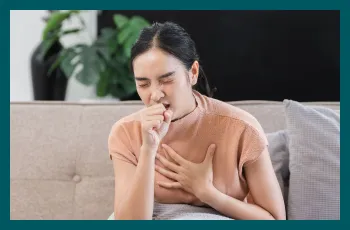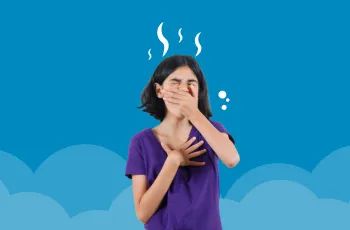Coughing Up Green Phlegm: What Does It Mean?
Written by Dr Nelson Lau, MBBS FRACGP, GP & Digital Health Specialist. Blog updated on 24 October, 2025. Originally published on 10 June, 2024.

Contents

Overview
Have you ever found yourself hacking away, producing a thick, green phlegm instead of the usual clear or white mucous? It's something we've all encountered at least once. Coughing up green phlegm can catch you off guard. The colour of what you're coughing up often tells you something about what's happening inside your body — whether you've picked up a simple cold or if something more concerning is going on.Understanding phlegm
Phlegm is thick mucous produced by your lungs and airways. Its job is to trap germs, dust, and other unwanted particles. You'll usually notice more of it when you're battling an infection like a cold or flu. Worth knowing:- It helps remove irritants, bacteria, and viruses from your lungs.
- The colour and thickness change based on what's happening in your body
- A small amount is perfectly normal — large amounts suggest your body's fighting something off.
Why is my phlegm green?
Green phlegm typically signals that your immune system has kicked into gear. When white blood cells attack germs, they release enzymes that can turn your mucous green or yellow. The key point: Green doesn't automatically mean you need antibiotics. It usually just shows your body is responding to an infection, which often starts viral.Causes green phlegm
A green tinge in your phlegm usually signals an infection or inflammation.- Bacterial infections: Picture your body as a fortress under attack by bacteria, like when you have bronchitis or pneumonia. Your white blood cells rush to the scene, releasing enzymes that attack the invaders, which can paint your phlegm green.
- Viral infections: Though less common, viruses like the flu can also turn your phlegm green, especially towards the tail-end of the illness.
- Sinusitis: A sinus infection can lead to green or yellow phlegm, particularly if you're battling a stuffy nose, facial pain, and pressure.
- Chronic conditions: Long-term ailments such as chronic bronchitis or cystic fibrosis can result in persistent green phlegm.
Different colours mean
Here's what you might see: Clear: Nothing to worry about, or possibly allergies White: Minor viral infection or blocked sinuses Yellow: Your immune system has started fighting an infection Green: Ongoing infection, could be bacterial or viral Brown or rusty: Possibly old blood, or related to smoking or chest infection Pink or red: Fresh blood present — get medical attention straight awaySymptoms
If you're coughing up green phlegm, watch for:- Fever— your body might be fighting something more significant
- Chest pain— could point to lung inflammation or infection
- Difficulty breathing— sometimes linked to bronchitis or pneumonia
- Wheezing— suggests your airways are inflamed or narrowed
- Tiredness— happens when your immune system is working hard
Experiencing these symptoms? Speak with a doctor within 15 minutes.
See a Doctor now
Available 24/7, across Australia.
What you can try at home (Mild Cases)
If things aren't too bad, these might help:- Drink plenty of water— thins out the mucous so it's easier to clear
- Breathe in steam— a hot shower or bowl of steaming water can loosen phlegm
- Get proper rest— your body recovers better when you're not pushing yourself
- Sip warm drinks— tea with honey and lemon can ease throat discomfort
- Stay away from cigarettes— smoking makes everything worse
- Run a humidifier— moist air keeps your airways comfortable and reduces coughing
When you should get help
Contact your doctor if you have:- Green phlegm lasting over 10 days
- High fever or chills
- Blood in your phlegm
- Trouble breathing or chest pain
- Existing conditions like asthma, COPD, or a weakened immune system
How Hola Health can help
At Hola Health, we understand how worrying it can be to notice changes in your mucus or develop a persistent cough. Our team of qualified doctors is here to help you get the answers and treatment you need — quickly and conveniently. With online doctors consultations available 7 days a week, you can connect from the comfort of your home. After assessing your symptoms, our healthcare providers can:- Identify the cause of your cough and green phlegm — whether it's a bacterial infection, sinus issue, or another respiratory condition.
- Suggest appropriate treatment, including antibiotics if necessary or other prescription medications.
- Offer advice on home remedies, hydration, and symptom relief to help you recover faster.
- Monitor your progress and adjust your care plan if your symptoms change or persist.
Frequently Asked Questions
Is coughing up phlegm a good thing?
Yes, it is your body's way of doing a deep cleanse. It is unpleasant but crucial for keeping your respiratory system free of bacteria. Phlegm kicks out unwanted guests such as dust and germs, so while it might seem not pleasant, it's a testament to your body's hard work in keeping you healthy.Is coughing up green phlegm a symptom of COVID-19?
While green phlegm can be concerning, it's important to remember it can stem from various respiratory infections, not just COVID-19. Common COVID-19 symptoms include fever, persistent dry cough, fatigue, and loss of taste or smell. If you're coughing up green phlegm alongside these symptoms, consider getting tested. But remember, green phlegm alone isn't a telltale sign of COVID-19—it could be your body fending off any number of respiratory bacteria.Why does phlegm change colours?
Clear or white phlegm often hints at a viral infection or allergies, as your body ramps up mucous production to flush out irritants. On the flip side, green or yellow phlegm can often point to a bacterial infection. This colour shift occurs because white blood cells swarm to the infection site, releasing enzymes that tint the mucous green or yellow, an indication that your immune system is working tirelessly behind the scenes.Is green phlegm bacterial or viral?
While green phlegm is commonly associated with bacterial infections, it can also show up in the late stages of a viral infection. During a bacterial infection, a surge of white blood cells moves to the infected area, resulting in the greenish hue. However, as a viral infection progresses, you might also spot your phlegm turning green as your body continues its immune response. Either way, green phlegm is a signal that your body is fighting against the infection.How can you tell the difference between allergy-induced phlegm and cold-induced phlegm?
Allergy-triggered phlegm tends to be clear and runny, mirroring your body's reaction to allergens like pollen, dust, or pet dander. This type of phlegm often comes with symptoms like sneezing, itchy eyes, and a runny nose. In contrast, the common cold-related phlegm is thicker and may change to yellow or green as your body combats the infection. Colds also tend to bring on other symptoms like a sore throat, body aches, and a mild fever. So, if your phlegm is clear and your nose is running, allergies might be the culprit. If it's thicker and you're feeling rundown, a cold could be to blame.Does coughing up green mucous mean you're recovering?
Not always. Coughing up green mucous can indicate your body is fighting against an infection, but it doesn't necessarily mean you're on the road to recovery. Sometimes, it suggests your immune system is still in overdrive, and you might need a bit more time to get better. If your symptoms continue, worsen, or you develop new ones like a high fever or chest pain, it's worth checking in with a doctor. They can give you the right diagnosis and ensure you're on track to feeling better.Need time off to recover? Get your medical certificate online within 15 minutes.
Request a medical certificate
Available 24/7, across Australia.
What we treat
- Cough
- Nausea & vomiting
- Fever
- Hayfever
- Fatigue
- Sore throat
- Acne
- Hair loss
- Gout
- Eczema
- Rosacea
- Sunburn
- UTI
- Erectile dysfunction
- Contraception
- Morning sickness
- Morning after pill
- Prostate health
- Anxiety
- Depression
- Stress
- Grief & loss
- Antidepressants
- Premature ejaculation
- Asthma
- Blood pressure
- Blood thinners
- Diabetes
- Cholesterol
- Migraines & headaches
- Allergies
- Body ache
- Heartburn & reflux
- Sleep disorder
- Pain relief
- Gastro
Related Articles
Disclaimer
This blog is for general informational purposes only and does not indicate that Hola Health provides all treatments or preventive measures mentioned. It is not intended to be a substitute for professional medical advice. Always seek the guidance of your doctor or other qualified health professional with any questions you may have regarding your health or a medical condition. For emergencies please immediately contact 000. Any medical topics discussed are intended to educate, not to imply availability through Hola Health.
 Facebook
Facebook  X
X  Copy Link
Copy Link



